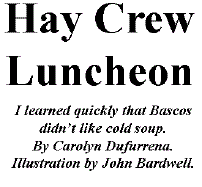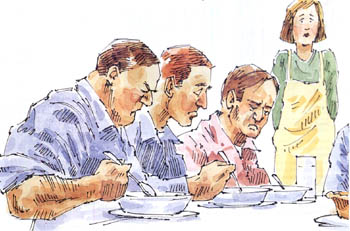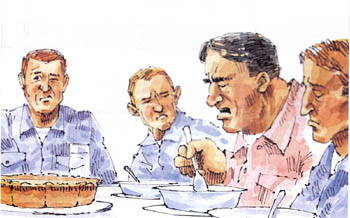 |  |
| [an error occurred while processing this directive] | |
| [an error occurred while processing this directive] |
|
It's 20 years ago now. Tim and his brothers were just starting out; we had a year'; we had a year's lease on 800 head of cows and a bunch of flood-irrigated alfalfa near the edge of the Black Rock Desert in Northern Nevada. I had a garden out my back door. It grew just fine as long as you planted right on the wet, but closed up tighter than Fort Knox between waterings. We'd spent the first three years of our married life in West Texas in the city, and this was the bargain. After three, we'd take the nest egg we'd made in the booming oil fields near Midland and come home and build the ranch with Tim's brothers. So this was my rookie year as a rancher's wife and certainly as a ranch cook. It was first crop and I was feeding the hay crew. Not that I didn't have experience entertaining, I thought, as I paged through my cookbooks. I had a trunkfull of journals from Auntie Gertrude, detailing years of Chicago bridge luncheons and brunches, each entry annotated with notes the following day, and all ending with the words, "a great success!" I knew how to fold a napkin, how to decoratively peel a cucumber. Of course I could feed people. "We'll be in at noon," Tim threw over his shoulder on his way out that morning. "Stacking crew'll be here, so there'll be seven of us." The June sun ripened as I considered the menu. My young son and I gardened, gathering lettuce and the last of the peas. Ah, I thought, wiping the perspiration from my eyes, a summer soup would be just the thing. When the men came in to wash, the table was all set, dishes sparkling, napkins folded attractively. Each place had a lovely, garnished bowl of smooth green soup; a single quiche Lorraine was daintily sliced in the table's center. There'd be one piece left over, I was thinking. I'd counted. Pleasantries exchanged, Ray, the contract harrow-bed operator, sat first. Six-four, he was a broad-shouldered Basco who ate at ranch tables all over the county. I knew the report of my first summer luncheon would spread quickly throughout the land. "This soup's cold!" he exploded. "Of course!" I replied. "What the hell's in it" he fired back. He looked incredulously at the opaque green surface, basil leaves thoughtfully garnishing the center, no doubt suspecting pond algae or moss from the trough. "It's Potage St. Germain. It's a puree of spring peas and lettuce. It's supposed to be cold!" I explained, sure that I would inject some class into this worthy but provincial group. Tim's two brothers and the three field hands ducked their heads to hide their faces and ate. It didn't take long. Someone reached for a slice of quiche. "Got any ketchup?" I was horrified. What about the delicate bouquet of herbs and spices? Tim gave me The Look, however, and I bit my lip. Fine, I thought, and went to the fridge, visualizing the line under Auntie Gertrude's luncheon entry evaporate. "A great success," indeed. Miffed at the ketchup issue, I moved things around in the refrigerator until true disaster struck. "Where's the meat?" Tim asked quietly. "Meat? This is a summer luncheon," I replied. His response was to start digging in the freezer for meat. It had taken the men about 30 seconds to inhale the lovely quiche triangles, and they were looking at me expectantly. I was stumped. Tim fried slabs of beef and reheated potatoes while I salved my dignity, and the men somehow finished their meal. I never heard the stories that must have made the rounds that summer with the hay crew, but I'm sure I was temporarily famous. I was really glad later on when we got to be cowboys. Tim took over instruction as I learned to make stew, rafts of sourdough biscuits, and great pots of beans to haul up to branding. I did hear plenty of ranch cook stories. Quinn River had been a stopping place at mealtime for more than a century, the big railroad bell out back ringing at six, 12 and six to call whoever was near the headquarters to come and eat. Twenty places were set at the table three times a day, plus a few extra for whomever might show up. People would time their arrivals for 11:45-well, there was nothing else out there for 70 miles. I asked my father-in-law, who ran that ranch for 20 years, about those cooks. "Who was the best?" Tim said he'd never tell me, and he didn't. "Had a lot of good cooks," he said. "Damn good cooks, and easy to get along with. They fed the whole ranch for $275 a month. Some of 'em were helluvacooks, but some rotten sonsabitches. One was good till she got to drinking. You knew they were good cooks because lots of people stopped to eat." One cook, let's call her Lula Belle, thought she owned the place for awhile; she locked up the commissary and even the ranch bosses had to check out the canned goods. Paid her more than the rest of the crew too, maybe $200 a month back then. "They all had their strong points," he said diplomatically. My husband said, "Well." Names were not named, but it became clearer to me why he didn't get all excited when I suggested a big breakfast one morning. "Just can't eat breakfast," he would say, looking sideways at the fried eggs and hotcakes. He was evidently still feeling the flapjacks of a particular teenage summer, the ones that soaked up entire bottles of syrup, swelled in his belly until afternoon, expanding with a quality that the World Health Organization would do well to learn about, for one of those cakes would have fed a starving family of four for a week. That life had changed, of course, by the time we had come back from Texas. The big ranches around there didn't run a cookhouse anymore; it was just me, and my quiche recipes. I learned to fill in the gaps, of course. When there's a crew to feed, my menus revolve around meat and potatoes. There are no delicate blends of herbs and spices, unless I'm cooking for my friends. All my soups are hot now. Those boys are just hungry, and they'll finish pretty much whatever you put in front of them as long as there's plenty, and then politely thank the cook. Still, every once in awhile, I can't resist putting a soft-boiled egg down in front of a cowboy-in an eggcup. And someday, I think a cold gazpacho might be fun to do again. Carolyn Dufurrena is a geologist, teacher, filmmaker, writer and cook. After 20 years at Quinn River, she can also be classified a rancher. But now the cowboys don't duck her meals.
|
|
|
|
| ||||||||
| [an error occurred while processing this directive] | ||||||||||



